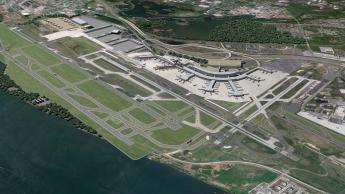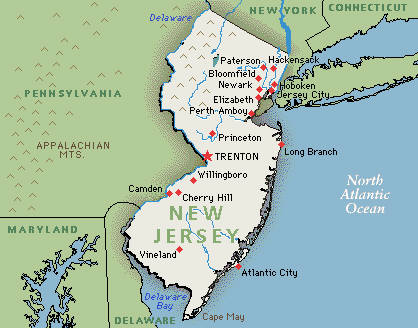Related Topics
The British Attack Philadelphia
Fighting in the Revolutionary War lasted eight years; for two years (June 1776 to June 1778) Philadelphia was the main military objective of the British.
City of Rivers and Rivulets
Philadelphia has always been defined by the waters that surround it.
Pacifist Pennsylvania, Invaded Many Times
Pennsylvania was founded as a pacifist utopia, and currently regards itself as protected by vast oceans. But Pennsylvania has been seriously invaded at least six times.
Why Did Admiral Howe Choose the Chesapeake?

|
| Philadelphia Airport |
A passenger on a plane approaching a landing at Philadelphia Airport from the south can see long stretches of straight highway along the banks of the Pennsylvania side of the Delaware River. To drive on that highway (I-495) takes twenty or so minutes at sixty miles an hour. The thought occurs that this would have made an excellent place for Admiral Howe to land his brother's troops, well below the narrow mud flats which made Fort Mifflin so formidable, but considerably closer to his Philadelphia objective than Elkton, Maryland where he actually did land. Why would he sail all the way to Norfolk and back up the Chesapeake when a shorter Delaware trip would provide less time for Washington to prepare a defense? The long confinement of the British horses aboard ship proved to create great difficulties, which essentially undermined his plan to disembark the troops without waiting for baggage and supplies and ride into a surprised and undefended Philadelphia. And, although hurricanes were poorly understood at the time, the extra three weeks pushed the British timetable into a September landing, where they did encounter two huge storms which were probably fall hurricanes. Why did he do this when a shorter voyage seemed available?

|
| Perth Amboy NJ |
Admiral Howe was notoriously secretive about his plans. He embarked at Perth Amboy without telling a single subordinate (or superior, either) what his destination was, and did not issue orders to his helmsmen until the fleet was out of sight of land. He wanted to surprise Washington, and he trusted no one. History will, therefore, have to guess what his thinking was. The question was posed to William Dorsey, a retired river pilot, a former member of the Delaware Board of Pilot Commissioners, and historian of the port. The answer was readily given: navigation of Delaware Bay was too tricky.
Whether or not they harbored rebellious sentiments against the British, or were merely protecting the livelihoods of colonial river pilots, the Board of Port Wardens was tightly protective of the charts and lore of the Bay. One Joshua Fisher had prepared what were recognized to be the most reliable charts of the snags and shallows and was willing to sell them. The Board of Wardens would have none of this, and poor Fisher was ultimately forced to move from Lewes to Philadelphia, where he had a house in what is now Fairmount Park. Furthermore, the Board was very careful to keep Tory sympathizers from becoming Delaware River pilots.
It's never safe to guess other people's motives, and at this distance, they scarcely matter. The plain fact of things is that navigation of a fleet of seven hundred sailboats up a snaggy uncharted river, without any available experienced local pilots, was just too unsafe to attempt. An extra three weeks at sea was a far safer bet.
Originally published: Friday, August 04, 2006; most-recently modified: Wednesday, June 05, 2019
| Posted by: Bill Dorsey | Aug 13, 2006 5:41 PM |
I'll start at the PA Historic Society at 13th and Locust. Tell me more about your explorations of the 18th Century Joshua Fisher. If he were a Tory, he might well have been a relative.
| Posted by: Bill Dorsey | Aug 11, 2006 4:35 PM |